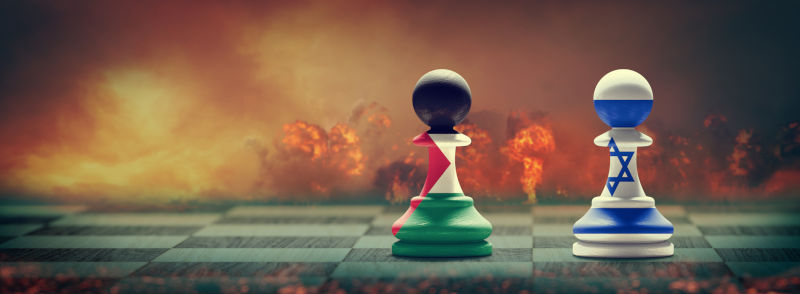The day after: Destroying Gaza will only yield future war
November 9, 2023
At the core of the cycle of violence in Israel and Palestine is the studied blindness of two people to see the other, to accept that they have a legitimate place on the landscape. Without such acceptance, this horrific war in Gaza will not be the last.
We cannot know when and how the Israeli-Hamas war will end. We can make well-educated guesses about what the day after will look like.
Israel will have obliterated much of Gazas physical infrastructure, including housing, medical facilities, transport and communications. It will have inflicted enormous damage on Hamashuman and materialbut will not have eliminated it entirely as a political or ideological entity.
On top of the deaths of possibly tens of thousands of Gazans, 2.2 million people will still have to regard Gaza as home. Many of them will be eking out a desperate existence.
Even if an Israeli invasion of Gaza has not triggered a wider war with Hezbollah in Lebanon, backed by Iran, or possibly a Palestinian uprising in the West Bank, the so-called international community will be more divided than ever about the Israeli-Palestinian conflict. The US will find itself sucked further into the conflict in a way that risks clear pain for uncertain gain. It will remain the country with the clearest capacity to shape both Israeli and Palestinian behaviour.
Israels strategy of managing the Palestinian problem rather than making compromisessuch as limiting West Bank settlement expansion and possibly even considering Palestinian statehoodwill have evaporated. It will either have to rule Gaza itself, foist it on to the feeble Palestinian Authority, or try to hand it back to Egypt, from whom Israel captured the territory in 1967. Israel will demand close control of any international arrangement to provide basic services in Gaza.
The Israeli-Palestinian conflict has long displayed many elements of a wicked problemsharply contested histories, competing victimhood, mutual brutality, shortsightedness and double-dealing. After the unfathomable horrors of the Holocaust, UN General Assembly Resolution 181 of 29 November 1947 designated 57 per cent of British mandated Palestine as Jewish and the remainder as Palestinian. Israels declaration of independence in May 1948, followed swiftly by the first Arab-Israeli war, resulted in Israel controlling 78 per cent of mandated Palestine. In 1967, Israel captured the West Bank and East Jerusalem from Jordan, and the Gaza Strip from Egypt.
Another quarter of a century would pass before Israelis and Palestinians formally acknowledged the reality of the other in the land they both claim. An exchange of letters between the Palestinian Liberation Organisation leader, Yasser Arafat, and Israel’s Labor Prime Minister, Yitzhak Rabin, led to the signing of the Declaration of Principles on the White House lawns in September 1993. Arafat confirmed the right of the State of Israel to exist in peace and security, Rabin that Israel recognised the PLO as the representative of the Palestinian people and would commence negotiations for Middle East peace.
Much was left to those subsequent negotiations on vital issues such as Israeli settlements in Palestinian territories and the final borders between Israel and the putative Palestinian state. The process offered an imperfect way forward. It was destroyed by two factors: terrorism, Palestinian and Jewish; and the assassination of Yitzhak Rabin in late 1995 by a fanatical West Bank settler.
Rabin, a tough, courageous man, believed the future had to be different. When, in late January 1994, a Jewish settler from the West Bank settlement of Kiryat Arba shot 29 Palestinians at prayer in the West Bank city of Hebron, Rabin told foreign ambassadors (of which I was one) I am ashamed to be an Israeli and a Jew. The best that the 87-year-old Palestinian Authority leader, Mahmoud Abbas, could manage after the Hamas atrocities on 7 October this year was a lame, “Hamas’ policies and actions do not represent the Palestinian people.
Responding to the 2023 Gaza war, on 26 October the UN General Assembly passed a (non-binding) resolution calling for an immediate, durable and sustained humanitarian truce and continuous, sufficient and unhindered provision of essential goods and services to civilians throughout the Gaza Strip. It condemned all acts of violence aimed at Palestinian and Israeli civilians. Australia abstained on the resolution, its Ambassador to the UN, James Larsen, arguing that the resolutions failure to specifically condemn Hamas and demand the release of hostages made it incomplete. Realistically, would such completeness make one iota of difference to the humanitarian crisis on the ground, which Australia and others maintain must be the priority?
Australia still voices support for a two-state solution. This ignores the relentless movement of Israeli settlers into the West Bank and East Jerusalem, now totalling over 500,000. If the two-state solution is a policy rather than just a talking point, the government should explain how it might become a reality. This could also send a positive message domestically. In the past weeks we have heard sharp debate nationally about the Israeli-Palestinian conflict. This points to demographic shifts in the community which will make it harder for governments to mouth platitudes. In the 2021 census, 3.2 per cent of Australians identified as Muslim, up from 2.6 per cent in 2016. The number of people identifying as Jewish remained steady at 0.4 per cent. These are not large figures but they can all be electorally meaningful.
In 2004, I wrote in Herzls Nightmare: One Land, Two Peoples that Israelis and Palestinians struggle to renounce their competing dreamseither a land freed of Jews or freed of Palestinians. This was not just about occupation and terror, it was about the studied blindness of two people to see the other, to accept that they have a legitimate place on the landscape.
With Hamas curbed, even rendered comatose, a renewed international effort should now encourage such acceptance. Without it, this horrific war in Gaza will not be the last.
First published in The Australian newspaper, 7 November 2023
